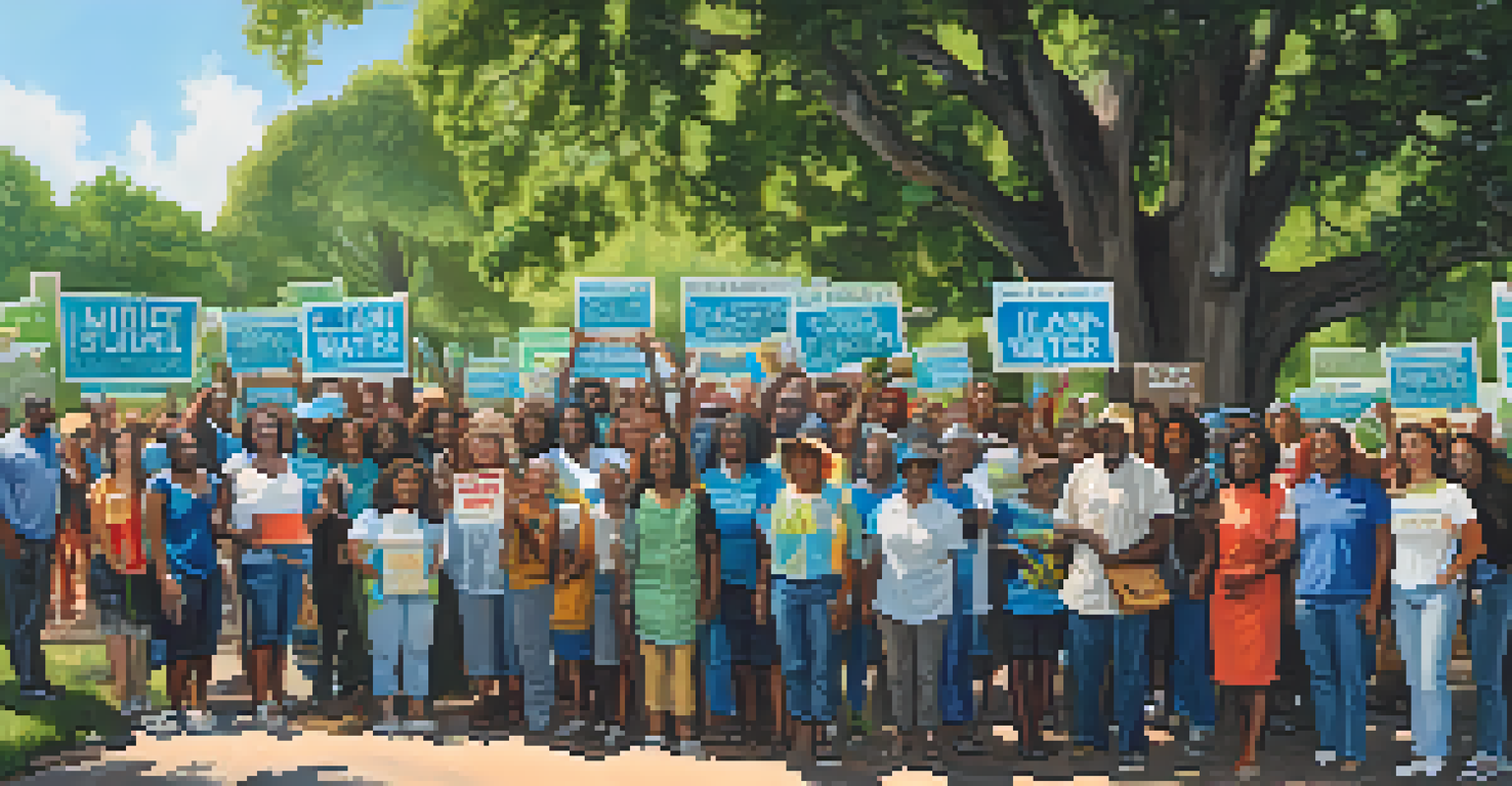Environmental Politics in Louisiana: Challenges and Responses

Overview of Environmental Issues in Louisiana
Louisiana faces unique environmental challenges, primarily due to its geography. With coastal erosion, rising sea levels, and frequent hurricanes, the state is on the frontline of climate change. These issues not only threaten the ecosystem but also the livelihoods of residents who depend on the land and water. Understanding this backdrop is essential for grasping the complexities of environmental politics in Louisiana.
The environment is where we all meet; where we all have a mutual interest; it is the one thing all of us share.
The state's rich biodiversity is under constant threat from industrial activities, including oil drilling and agriculture. This creates a tug-of-war between economic development and environmental preservation. For instance, the oil and gas industry plays a significant role in Louisiana’s economy, but often at the expense of wetlands and wildlife. These conflicting interests make environmental politics a hot topic among policymakers and citizens alike.
Additionally, Louisiana's cultural heritage, particularly among Indigenous communities, is intricately tied to the land. As environmental degradation continues, these communities face not only loss of territory but also the erosion of their cultural identity. This intersection of environmental and cultural concerns brings a human dimension to the political discourse, highlighting the need for inclusive solutions.
The Role of Government in Environmental Protection
The state government of Louisiana plays a pivotal role in shaping environmental policies. This includes regulating industries, managing natural resources, and enforcing environmental laws. However, the effectiveness of these regulations often comes under scrutiny, especially when economic interests seem to take precedence over environmental health. Balancing these priorities is a constant challenge for state officials.

At the federal level, agencies like the Environmental Protection Agency (EPA) also influence Louisiana’s environmental politics. They provide guidelines and funding for various conservation programs, but their involvement can sometimes lead to conflict with state regulations. For example, when federal standards are perceived as too stringent, state leaders may resist compliance, complicating efforts to protect the environment.
Louisiana Faces Severe Environmental Threats
Coastal erosion, industrial activities, and climate change pose significant risks to Louisiana's ecosystem and communities.
Local governments are increasingly stepping up as well, implementing initiatives that reflect community values and needs. These grassroots efforts often focus on sustainable practices, such as improving public transportation and promoting renewable energy sources. By engaging residents in the political process, local leaders can create more tailored solutions that address the specific environmental challenges faced by their communities.
Coastal Erosion: A Defining Challenge
Coastal erosion is arguably one of Louisiana's most pressing environmental issues. The state loses approximately a football field of land every hour due to this phenomenon, driven by a combination of natural and human-induced factors. This loss not only threatens ecosystems but also places communities at risk of flooding and storm surges. The urgency of addressing coastal erosion cannot be overstated.
What we are doing to the forests of the world is but a mirror reflection of what we are doing to ourselves and to one another.
Efforts to combat this issue include various restoration projects aimed at rebuilding wetlands and restoring natural barriers. Initiatives such as the Louisiana Coastal Protection and Restoration Authority (CPRA) work to implement strategies that can mitigate the effects of erosion. These projects often involve significant funding and collaboration among various stakeholders, including government agencies, non-profits, and local communities.
Despite these efforts, challenges remain in securing ongoing support and funding. The complexity of coastal restoration projects, along with competing interests, can hinder progress. Nevertheless, raising awareness about the importance of Louisiana's coast encourages community involvement and advocacy, which are vital for sustaining momentum in these crucial initiatives.
Climate Change Adaptation Strategies
As climate change continues to impact Louisiana, adaptation strategies are becoming increasingly important. These strategies aim to prepare communities for the effects of rising sea levels, extreme weather events, and changing ecosystems. For example, cities like New Orleans are implementing resilience plans that focus on infrastructure improvements and disaster preparedness.
One notable approach is the development of green infrastructure, such as parks and green roofs, which can help absorb excess rainfall and reduce flooding. This not only mitigates climate impacts but also enhances urban biodiversity and improves quality of life for residents. These initiatives reflect a growing recognition of the interconnectedness of environmental health and community resilience.
Government's Role in Environmental Policy
The effectiveness of Louisiana's environmental regulations is challenged by the need to balance economic interests with ecological health.
Moreover, educational programs aimed at increasing public awareness about climate change are essential. By fostering a better understanding of these issues, communities can mobilize to advocate for necessary changes at local, state, and federal levels. Ultimately, proactive engagement in climate adaptation can empower Louisiana residents to take ownership of their environmental future.
Community Involvement in Environmental Advocacy
Grassroots movements have become a powerful force in Louisiana's environmental politics. Community members are increasingly organizing to advocate for policy changes that reflect their values and priorities. These movements often focus on issues such as pollution, land use, and access to clean water, emphasizing the need for local voices in the political arena.
For instance, environmental justice organizations work to address the disproportionate impact of environmental degradation on marginalized communities. By highlighting these disparities, advocates can push for equitable policies that protect vulnerable populations. This grassroots activism not only raises awareness but also encourages collaboration among diverse groups, fostering a sense of unity in the fight for a healthier environment.
Social media has also played a key role in amplifying community voices. Platforms allow activists to share information, mobilize supporters, and raise funds for initiatives. This accessibility helps bridge gaps between communities and policymakers, ensuring that the concerns of residents are heard and considered in decision-making processes.
Economic Impacts of Environmental Policies
The economic implications of environmental policies in Louisiana are significant and multifaceted. While some argue that stricter regulations can hinder economic growth, others believe that sustainable practices can lead to long-term benefits. For example, investing in renewable energy can create jobs and stimulate economic development, while also mitigating climate change impacts.
Industries such as tourism and fishing heavily rely on a healthy environment. When policies prioritize environmental protection, they can ultimately support these vital sectors. For instance, clean waterways and preserved natural landscapes attract tourists, boosting local economies. This highlights the interconnectedness of environmental health and economic vitality.
Community Advocacy Drives Change
Grassroots movements and social media empower Louisiana residents to advocate for equitable environmental policies and sustainable practices.
However, the transition to greener practices often requires upfront investment and can meet resistance from established industries. Balancing short-term economic interests with long-term environmental sustainability is a complex challenge for policymakers. By engaging stakeholders in the conversation, it’s possible to create policies that benefit both the economy and the environment.
Future Outlook for Environmental Politics in Louisiana
Looking ahead, the future of environmental politics in Louisiana will likely hinge on the ability to adapt and innovate. As climate change intensifies, finding effective solutions to ongoing challenges will be crucial. Policymakers, community leaders, and residents must work collaboratively to create a shared vision for a sustainable future. This requires a commitment to ongoing dialogue and action.
One promising trend is the increasing recognition of the importance of environmental justice. As more people understand the interconnectedness of social and environmental issues, there is potential for transformative change. By prioritizing equity in environmental policies, Louisiana can ensure that all communities benefit from a healthy environment and have a seat at the table.

Ultimately, the future of Louisiana's environmental politics will depend on the engagement of its citizens. Active participation in advocacy, policymaking, and community initiatives will be essential for driving meaningful change. By coming together to address the challenges ahead, Louisiana can build a resilient and sustainable future for generations to come.